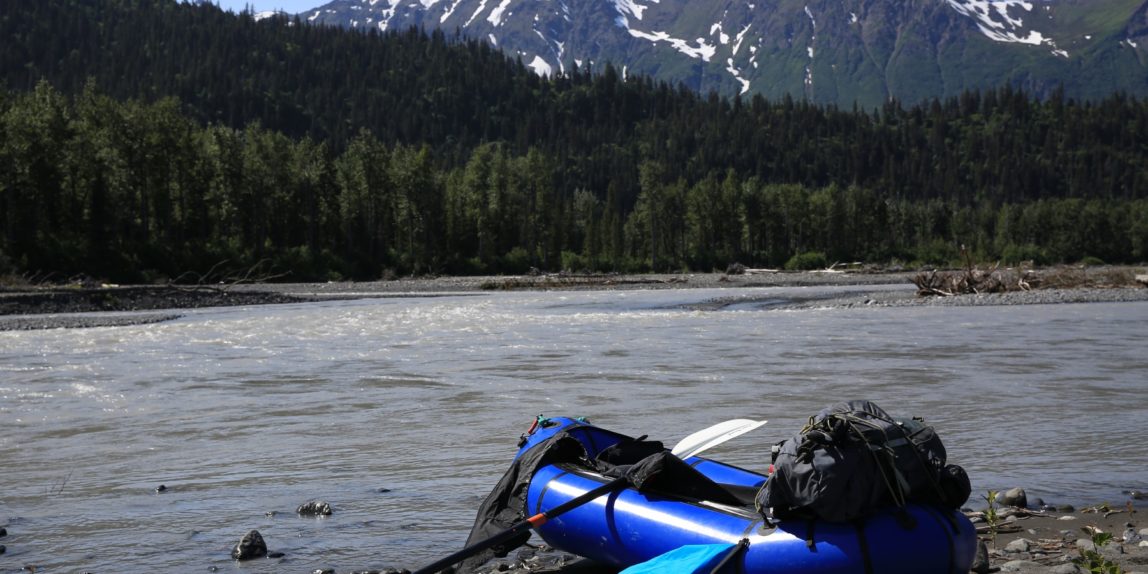More fish, more wilderness and more wonderful people
The last entry will be in english again. I dedicate it to the nicest and absolutely wonderful people I visited in Homer: Stephanie and Chuck. I met them at Castner Glacier after walking the wrong side of the river and never finding the glacier cave in the end of May. Chuck had told me after the hike and a nice dinner in their camper, that I would be welcome to stay at their house if I ever make it to Homer. There would be a chance he could take me fishing, as he is a commercial fisherman working a one man company with the support of a deckhand and of course Stephanie.
Well you shouldn’t offer me something unless you are willing to let it happen. Here I was in Homer and Chuck kept all his promises / fulfilled all my hopes. I landed in Homer at 7am and to get to their house which is 9 miles out of the town center I took the taxi for the first time in the month of June. So far I had only hitch hiked, taken a ferry or a plane to get from A to B. Chuck studied Geology and has after a few years of working decided he would rather want to be a fisherman and is now catching salmon from end of June to early August with a drift net. The rest of the year he engages many different jobs including setting up weather stations all over Alaska for the government. This made me think about whether I would be capable of saying good bye to a one job life and just do what ever I like and other “here and there” jobs to be able to pay my bills. I have to admit that I don’t think I would have the courage to do it (yet).
So after preparing the boat on the day of my arrival, we went to the harbor at 12:30 am, so a half hour past mid night and made our way to the fishing area in the Cook Inlet, the inlet which eventually leads to Anchorage and the Turnagain Arm which I talked about in Girdwood. The lovely boat of Chuck was build in 1961 and has an old truck or industrial engine and is the slowest boat in the fishing fleet. So we were the first out on the water.
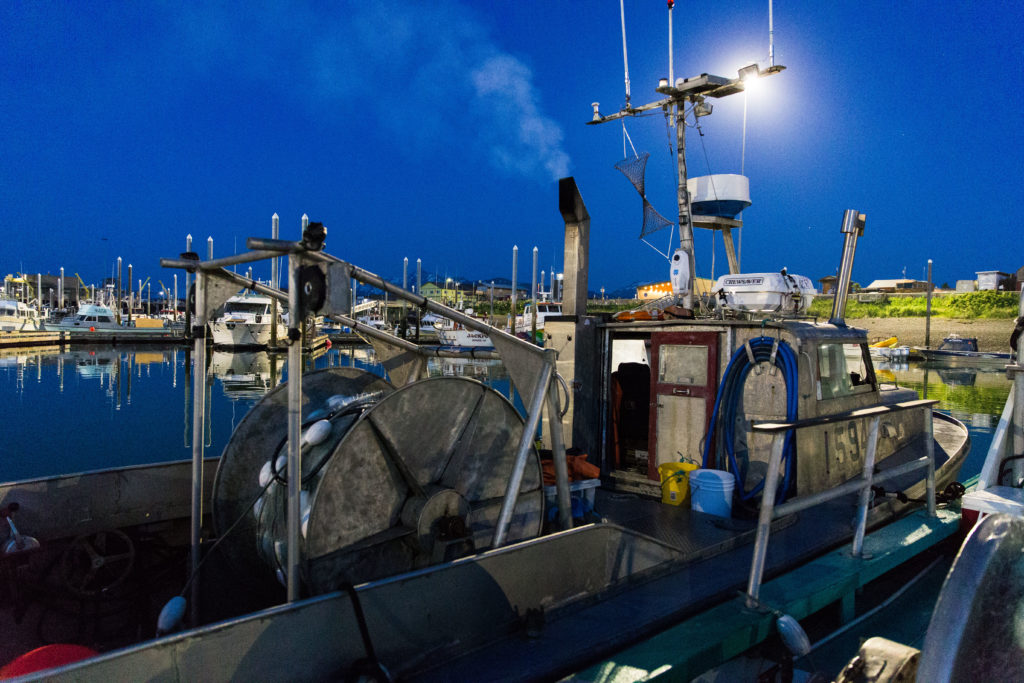
Being scared of becoming sea sick during the 24h on the ocean, I had taken some pills, but I guess I didn’t really need them. With a rough ocean and the loud motor I slept at least two hours while Chuck was making his way through the waves and past the sea otters (later more on them). 7am we are right on the line where the fishing area starts and we roll out the net (6m deep and 300m wide). The net stays in the water for one hour and it relies on the salmon, which are swimming into the inlet, to get caught in the net. Well we are in preseason for the inlet and the first net we pull in has an exact amount of 0 salmon… Chuck calls that a waterhaul. I was kind of prepared for that as Chuck said it would be like that till mid July. He calculates that he can break even with his costs if he catches about 25 sockeye (red) salmon not taking into account all the money invested into boat, net, license, etc. The key is to find a current change where the fish get stuck and move along either the one side of the current change or the other. You can see these changes pretty well as the water color and the waves on top seem very different. Well we found one for the second set, the problem is to keep your net in position which Chuck tried to do vigorously.
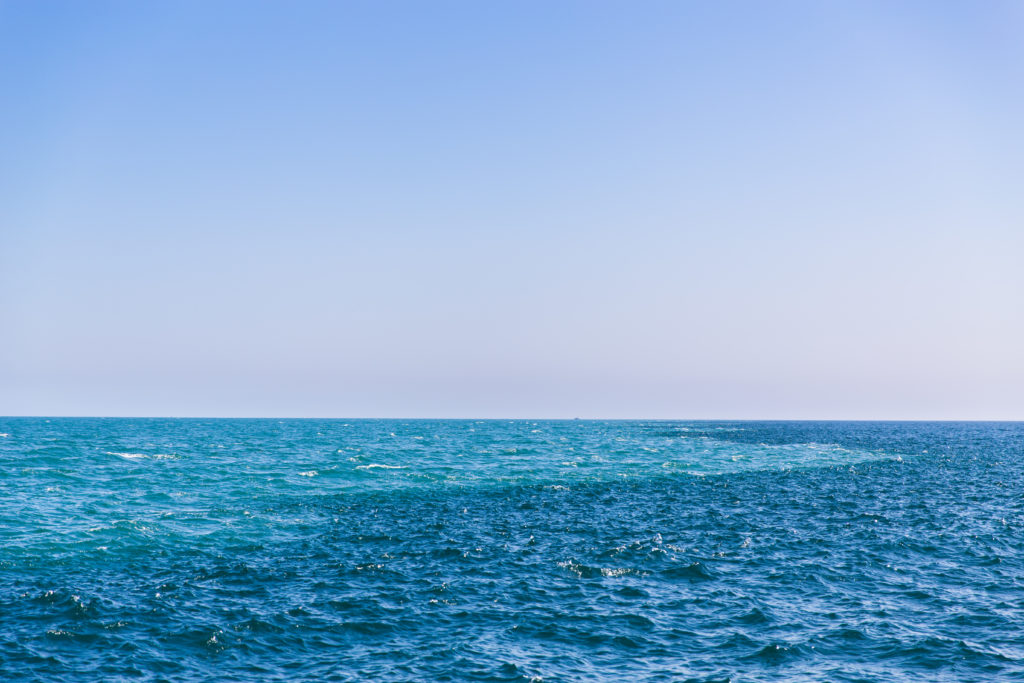
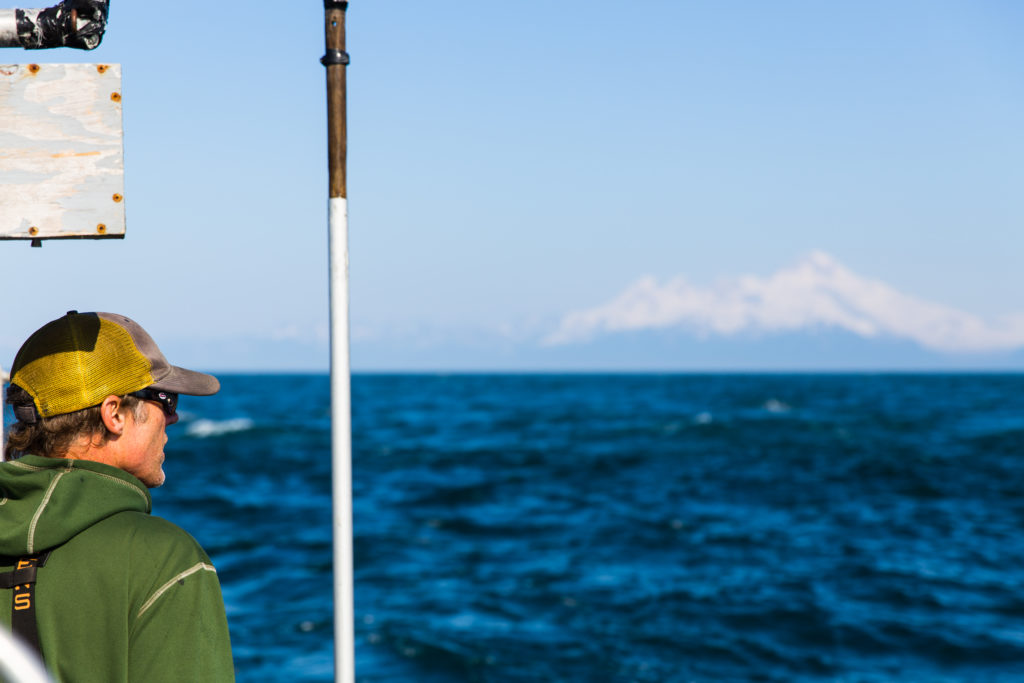
This was probably our only chance to make it into a good day, as there seemed to quite some fish caught in the current change. In 2 sets we caught 21 fish (or rather Chuck did). Unfortunately by the time we wanted to throw the next one the tide had changed and we were drifting close to the virtual line marking the end of the fishing license. As mentioned before, everybody follows the rules fishing in Alaska so Chuck drove the boat against the current and away from the border of the permit. It all went downhill from there. First I dropped a (already killed, otherwise it wouldn’t have been so bad) sockeye in the ocean and then we never found a spot like the first again. After 12h of fishing Chuck hat caught 24 sockeye, 4 pink and 1 chum salmon (actually two chum, but Chuck says he dropped one in the water too). That makes 8 fish with the sets 4 to 8 (was it 8 nets in total Chuck?). Well for Chuck it was a breakeven day, with a cheated calculation and for me it was a great experience to see the life of a commercial fisherman.
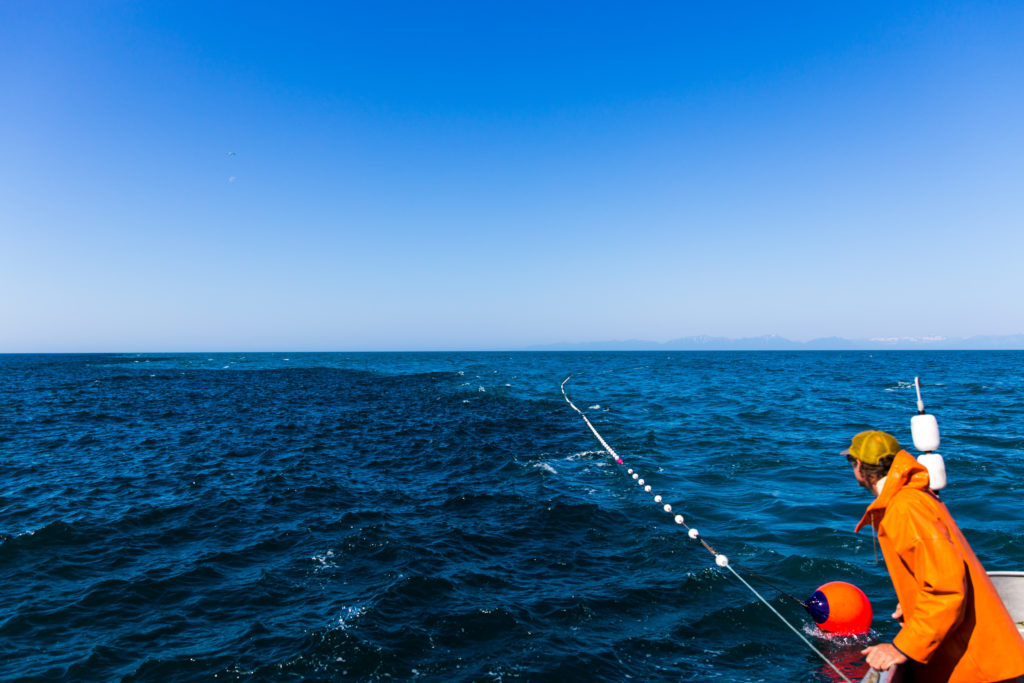

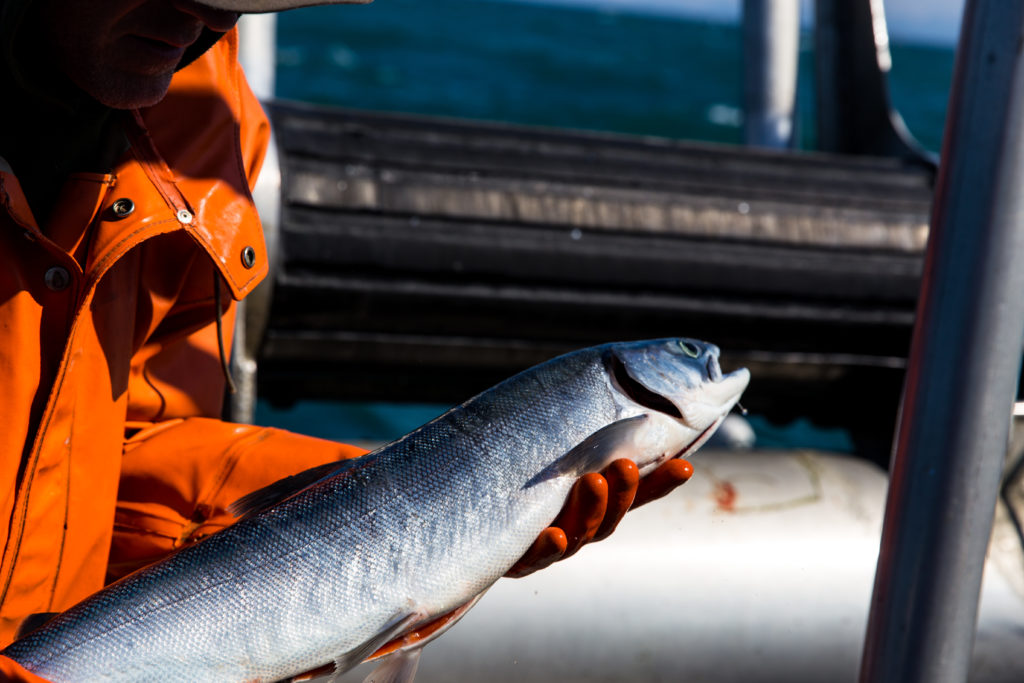
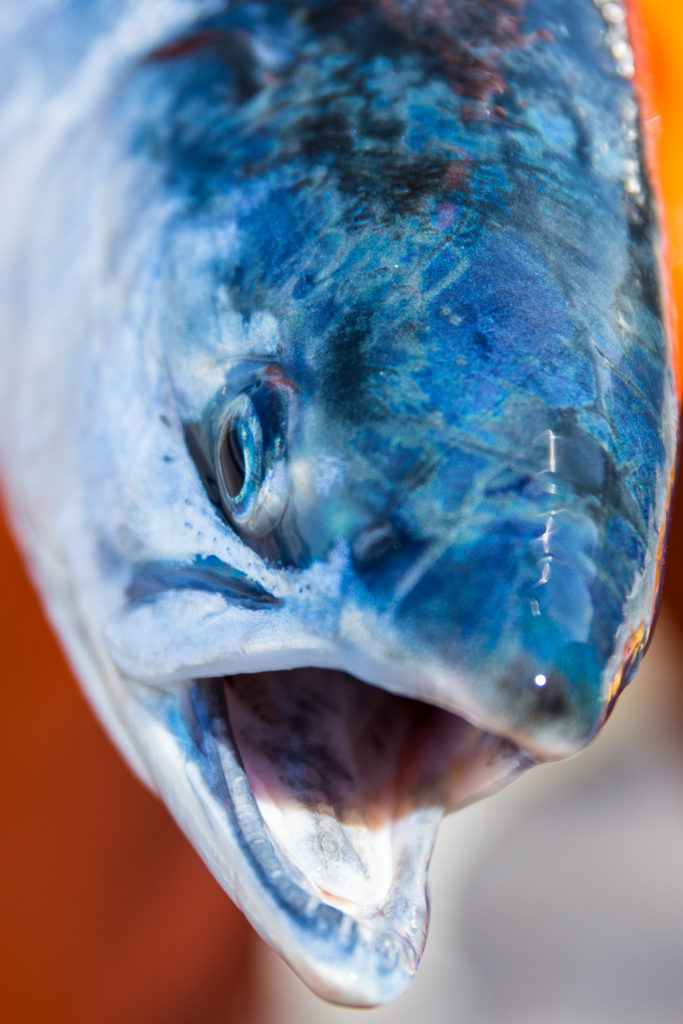
I learned so much more about the fish, as Chuck seems to know every single detail. It is remarkable how much meat these salmons have compared to their rather small organs. All fish we caught (except for the Chum Salmon) had empty stomachs as they had already stopped eating even before hitting the freshwater of the rivers. The Chum had just recently swallowed a bunch of little fishes (I am leaving out the pictures as some people might not like them). Chuck treats the fish with as much respect as he can (while killing them). They are killed right after they are caught; they are always carried with two hands, as their spine snaps if you hold them up by the tail; they are cleaned on the boat and directly put to ice. If you wanted to aggressively defend the fisherman you could come up with a chain of thought like this: The salmon which are caught are going to their spawning grounds and are dying anyway directly after they spawn (lay their eggs). It is not clear that the more fish go in the river the more baby fish will come down again as 1) they pile up in the rivers and in front of waterfalls until they die of exhaustion, 2) they kill themselves on rocks while jumping on top of each other until they suffocate, 3) they grow teeth when they reach their spawning grounds (called kype, one of the fastest growing bones) to attack and kill each other to fight over spawning grounds in the lakes. That is no reasoning I would ever agree to, but it is definitely not wrong.
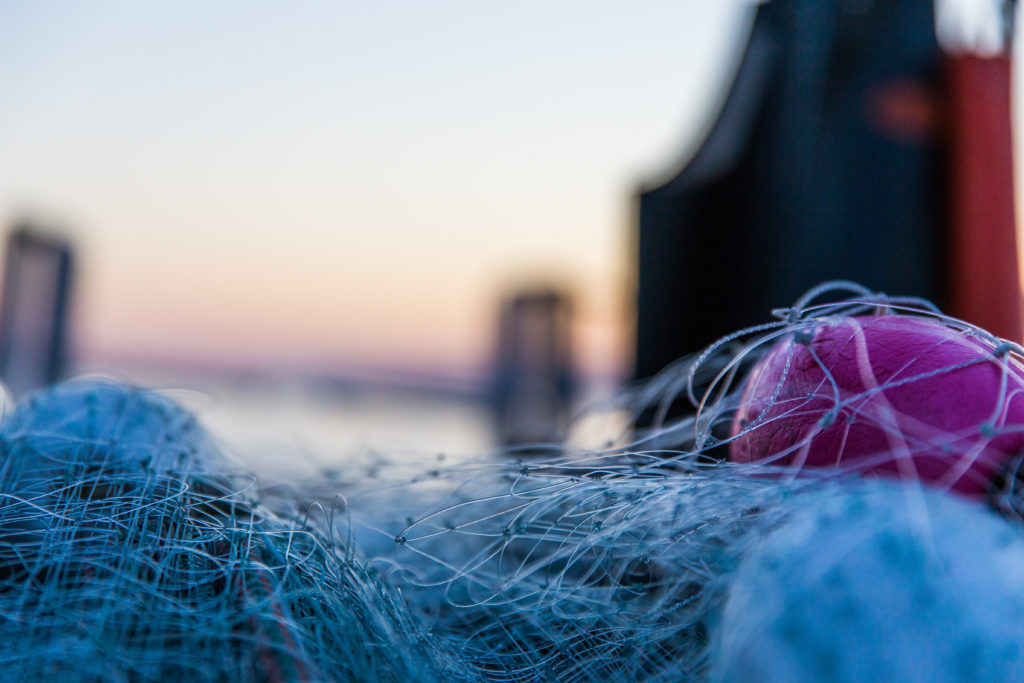
I wouldn’t want to be a fisherman as “harvesting”/killing animals does not sound like a nice job description to me, but I run the rule: “If you can’t kill an animal yourself, then you shouldn’t eat it.” I guess I payed my dues accompanying Chuck. I ate more fish in Alaska then in the last 5 years combined and if I were to continue that (not planning to do so) I would rather have em caught and handled by someone like Chuck than bred on a fish farm. Also eventhough the fisherman amongst each other communicate constantly over the radio and help each other out somewhat, they reminded me of people in the financial industry. You pretend to be working together, but actually you are really just working for yourself. I have to admit it sounds more logic if you are in a one man company (fishermen) than working for the same company in finance… but hey not everyone has woken up yet. So albeit being nice people I wouldn’t like to work amongst them.
We got home around midnight and we managed to get some beautiful pictures and stay away from the large groups of sea otters floating in the Inlet. 24hrs of fishing done. Thank you Chuck for taking me.
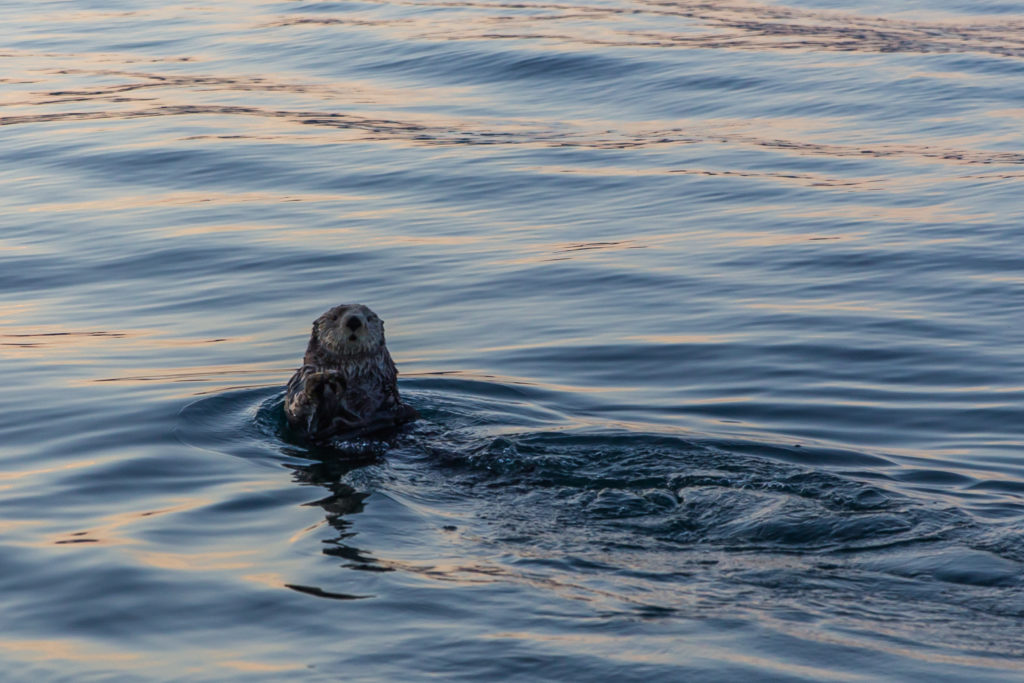
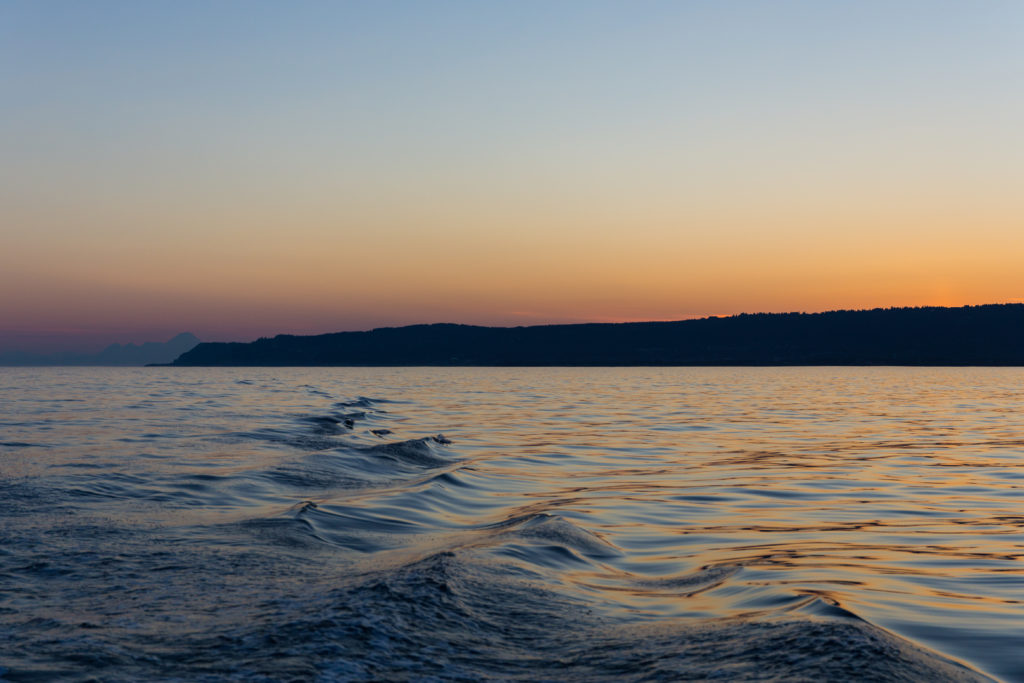
The next day I went on a last trip into the wilderness. I took a water taxi over to Kachmak Bay and started out of a very pretty lagoon. The responsible park ranger did not recommend going there and the people at the water taxi called me crazy and made sure everybody had heard them say it. I got pretty used to that and I have to admit that the trail was closed due to flooding of the trail (a stretch of about 150m). Chuck had been on that trail before and knew the flooding was not really an issue and he provided me with all the gear: Packraft, Nylon Socks to pull over the shoes, life vest, paddles and a map. Chuck had recommended the trip as it has a nice view from a mountain, a nice cabin and an easy float out on a packraft down the Wosnesenski river to the ocean where I would be picked up the next day.
Well Chuck was right, but he didn’t mention all the rest of the trail was gonna be a pain in the butt. I have to admit that coming to the end of my travels in Alaska my body seemed to have cooled down and I was really tired starting the trail, so my mental capacity to overcome difficulties was rather low this time. The trail was in an ok shape on my way to the cabin,
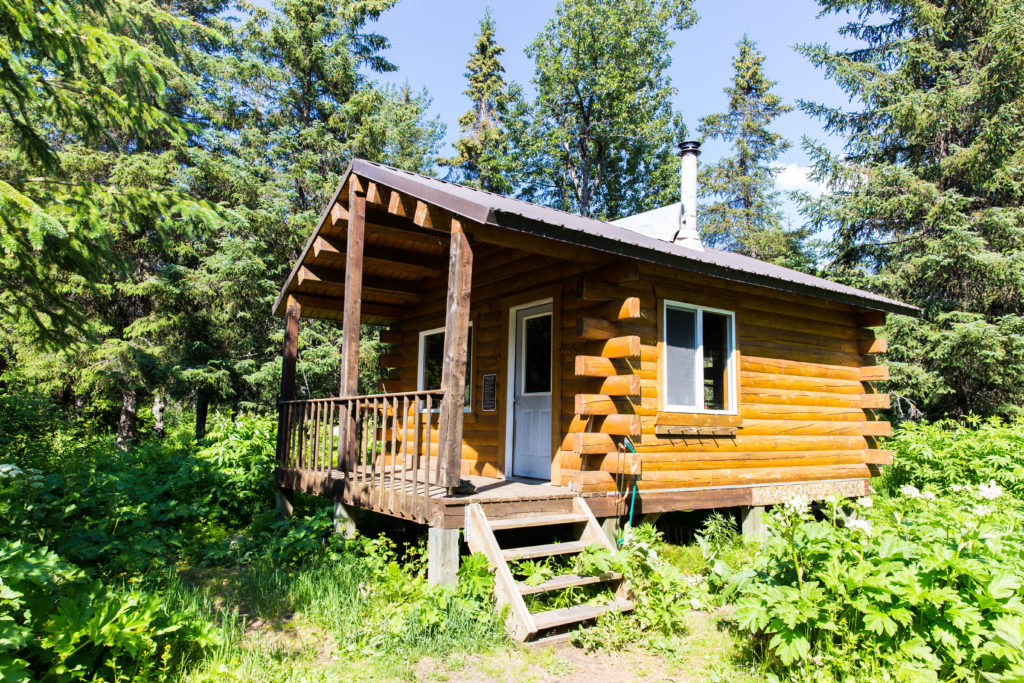
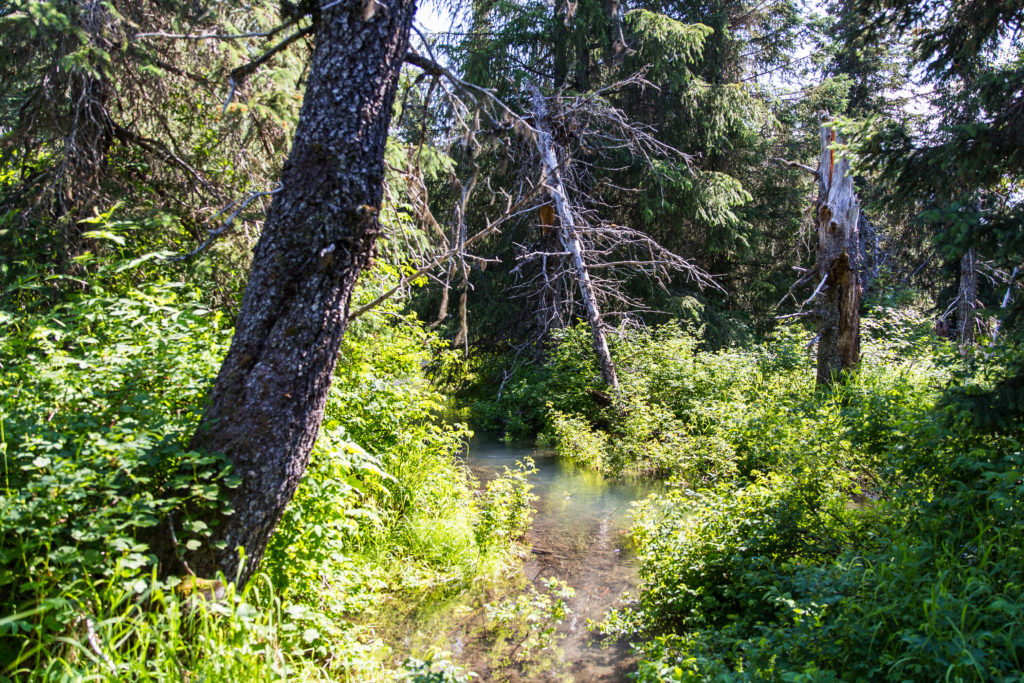
but got worse climbing China Poot Peak (a mountain they call little Matterhorn, because it was formed by glaciers flowing around it forming the triangular shape the Matterhorn has). The climb was a steep uphill battle on an overgrown trail with no water access. The last 100m of altitude were a scramble up an area of rockfall. Not the place you want to be in all by yourself (it goes without mentioning there was no one on the trails besides myself).
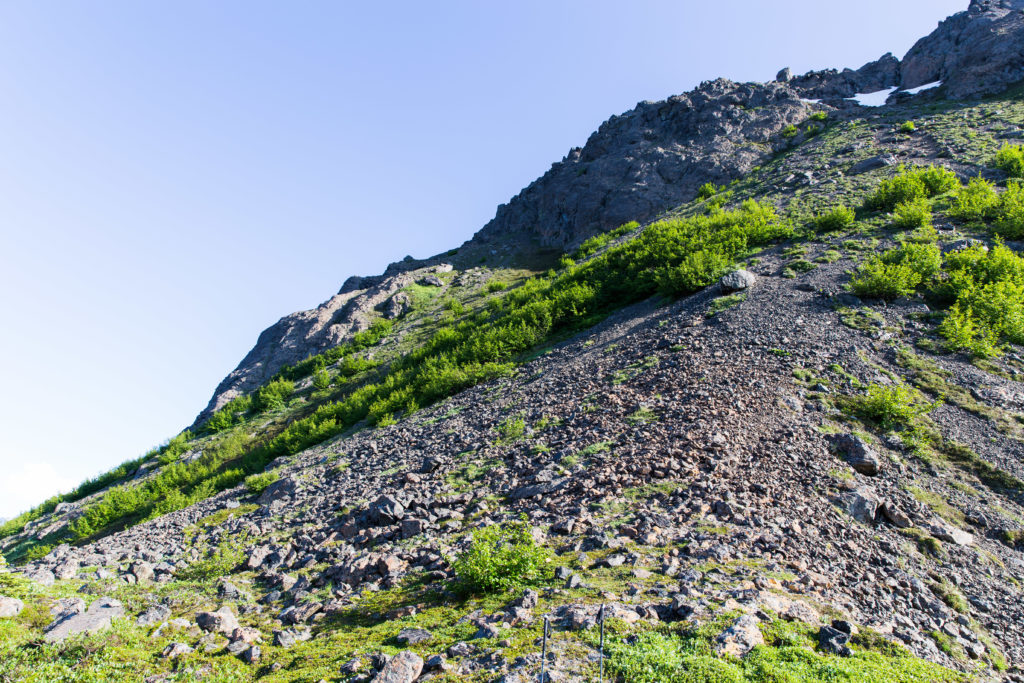
Well on top the views were great to two glaciers and an ice field on the one and to the bay and Homer on the other side. It was sunny and windstill, which is great everywhere on earth but not in Alaska. I sat up there with my head net on my head trying to free myself of mosquitos and shredding the views with that net right in front of my eyes. I didn’t last half as long as I had wished to stay.

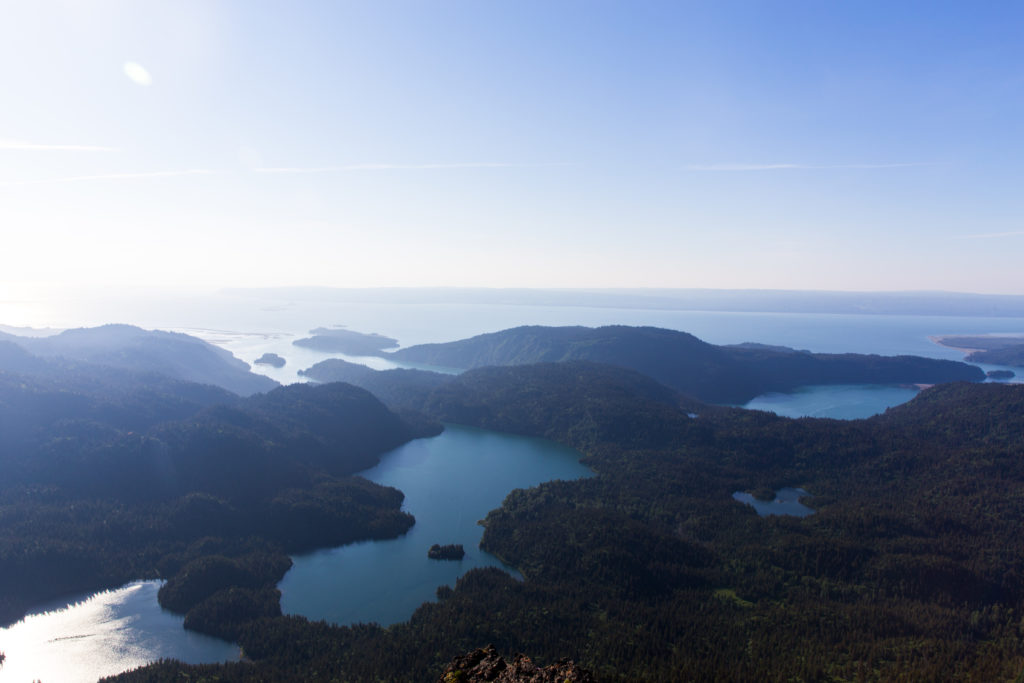
The cabin was great and the lake also provided some nice moments during sunset:

The next day I packed up and went on the trail to the river… wait trail is a bit exaggerated here, as yes there was a trail, but it hadn’t been maintained for a very long time and it was completely overgrown. The issue with that is that it is overgrown with devils club. Like the name suggests you don’t want to touch that stuff as it leaves some nice red dots on your skin formed from your own blood. In addition to fighting through bushes, fallen trees, head high grass, the amount of bear poop was increasing with every step I took. You don’t want to be in bear country with a vision field of 2m. There was bear poop on the trail about every 300-400m and I could find spots where a bear must have laid down in the last 24 hrs as the grass was all trampled just next to the trail.
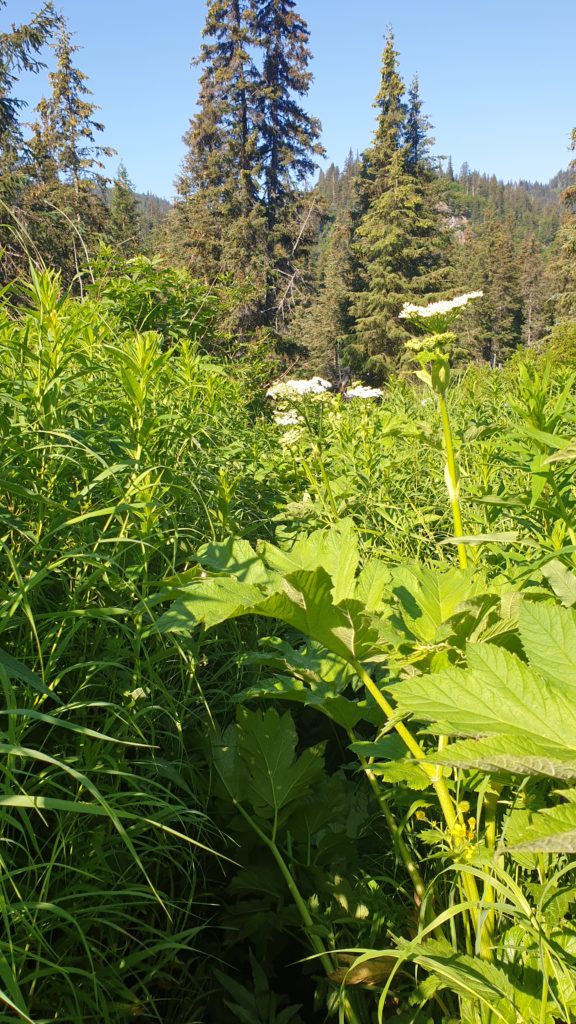
Yes bears prefer walking on trails just like we do. It took me more than double the time I had planned and I was continuously cursing out loud, as I had to make noise to scare the bears anyway. Oh dear, that was next to the first hike in Alaska the most nerve wrecking experience I had…
Well here I was, just 200m from the river bed with scratches all over my armes, mosquito bites itching and a very upset mind when the trail just stops in front of a very dense birch forest (not real trees, but rather thick bushes). Try navigating through that with a huge backpack with a packraft tied to the back and the paddles sticking out.

It took me 20-30 minutes to get through those 200m and when I reached the very wide riverbed I almost cried of physical and mental exhaustion. I literally screamed of excitement. Now I just had to get the boat inflated and make it down this river.
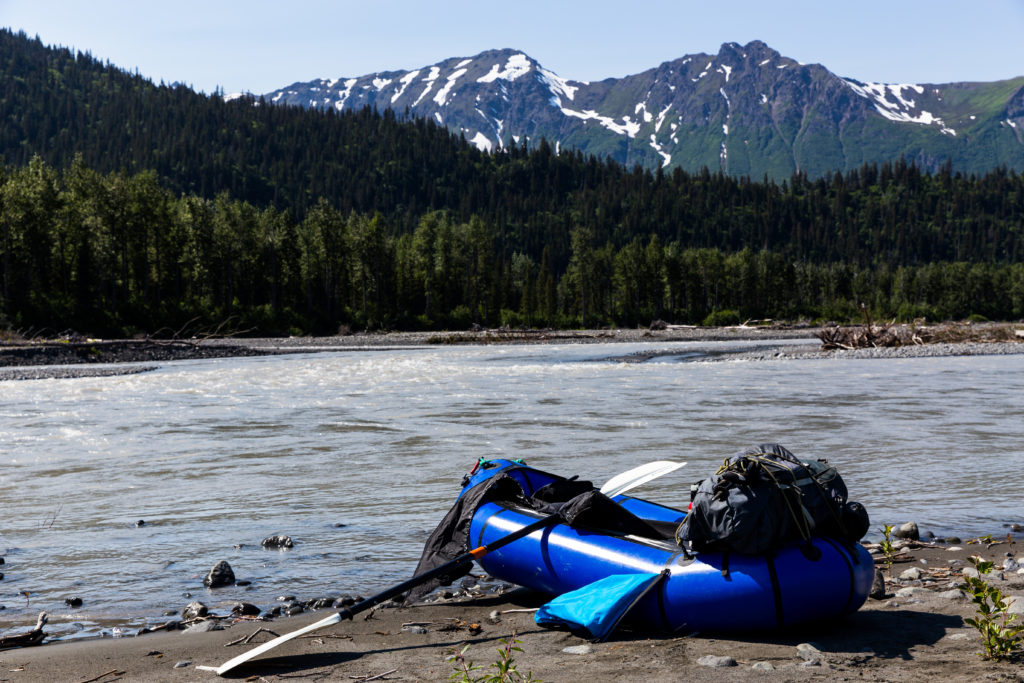
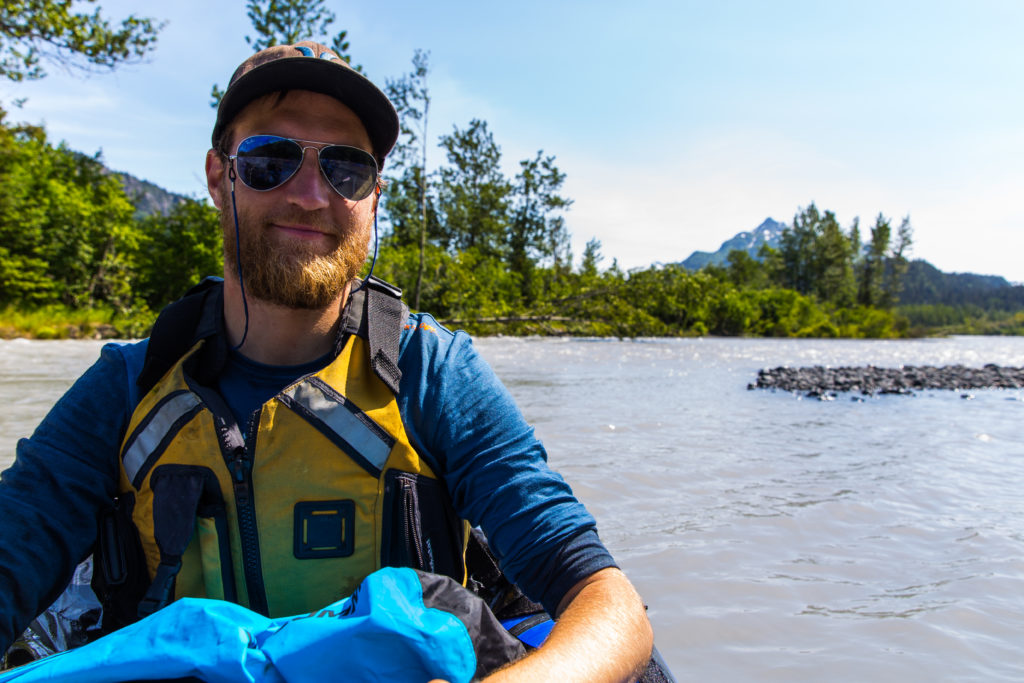
The floating was an awesome experience and it felt like playing gameboy. You are a little man in a boat trying to ditch the traps of rock beds and fallen trees going left, right, left, right. I got so excited that I took my camera and smartphone out to take pictures, did 360 turns in the boat and stuffed my smartphone in my life jacket to have it easily accessible. That turned out to be a bad idea. I came across this fallen tree and decided I should get out of the water and drag the boat to a different stream to avoid running into the tree:
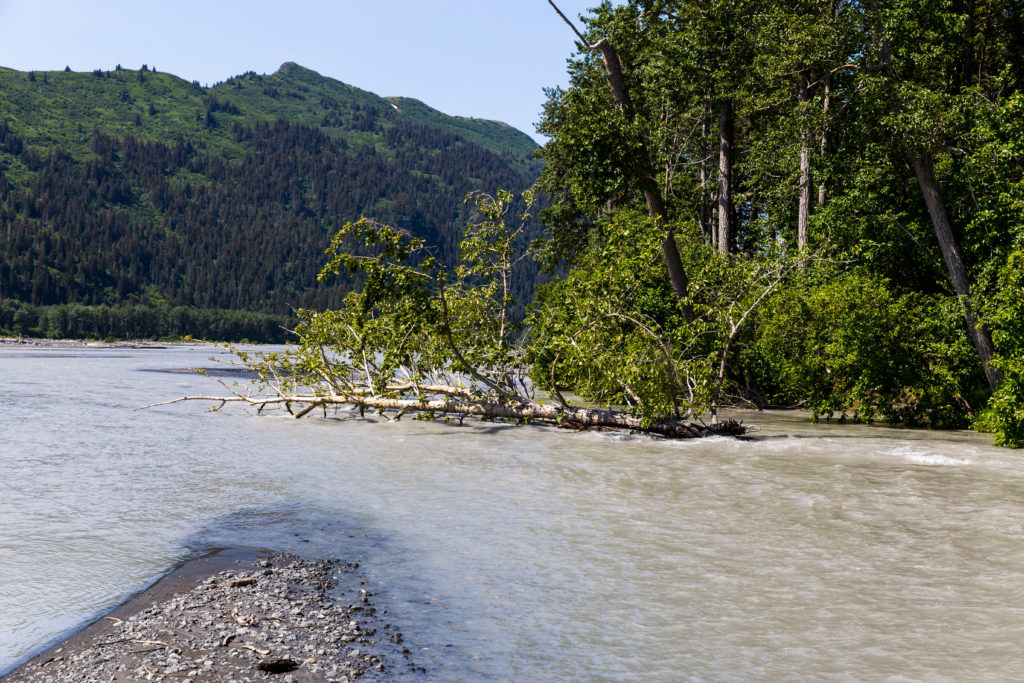
Where did I put the phone? Right, right in that life vest. I only realized it had fallen out when I reached the rocks and decided to take a picture. Here I was on all fours in the river fed from the glacier (pretty cold) and trying to find my phone. Does a phone in a case (case was full of credit cards and drivers license) float down or does it immediately sink to the ground?:
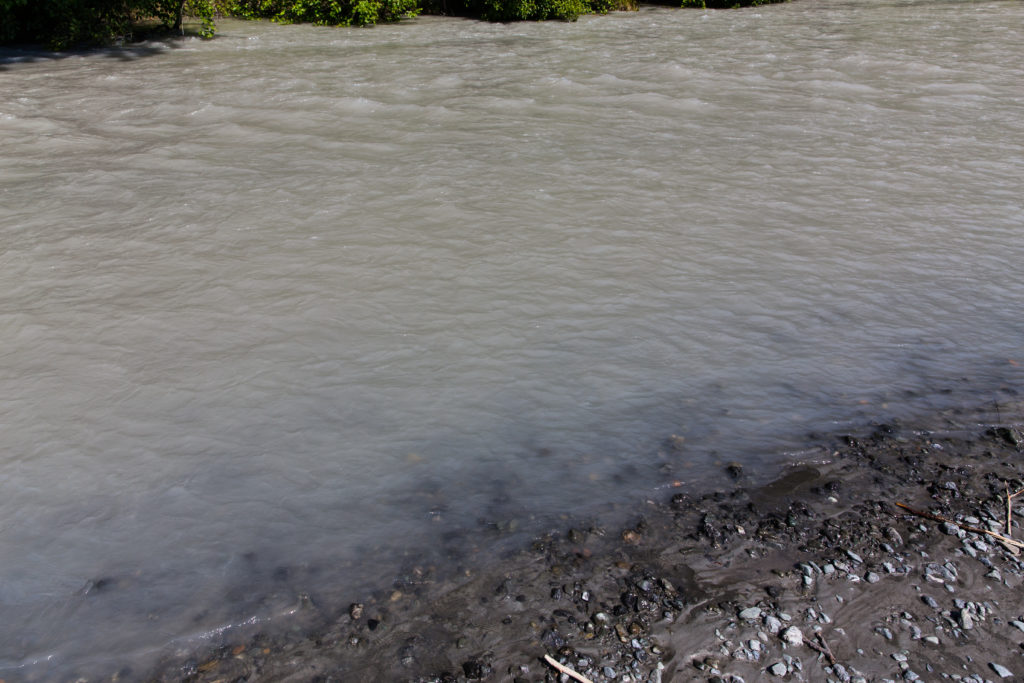
Just as I had given up, I discovered my foot tracks on the sand and wondered why I had walked so far downstream with the boat as that only got me closer to the tree. I went and followed the footprints to the river and tried my luck again. After 30 minutes and very frozen hands I knocked my smartphone and it floated up for a second. I grabbed it and it was actually still running. What a crazy miracle. Here I am yelling of excitement once again. Unfortunately the phone is now dead, after I managed to do several calls with it and has not come back to life after about 4 days (had it repaired now). At least I have my sim cards and my credit cards back. Well on we go. As I had lost the map of Chuck, which must have popped out when the paddles snapped out of my backpack climbing through the birch forest and my smartphone was off, my navigation possibilities were rather limited. I was supposed to find a road on the right hand side of the river (“you can’t miss it”, Chuck had said). I never found that road and Chuck hasn’t been on that river for years as I discovered after I got back. So I floated all the way to the ocean and after some difficulties of finding the pickup spot, finally got picked by a water taxi up sitting on a beach like Tom Hanks in Cast Away. At least I felt as exhausted and mentally stressed as the character that Tom Hanks has played in the movie (called Chuck by the way).
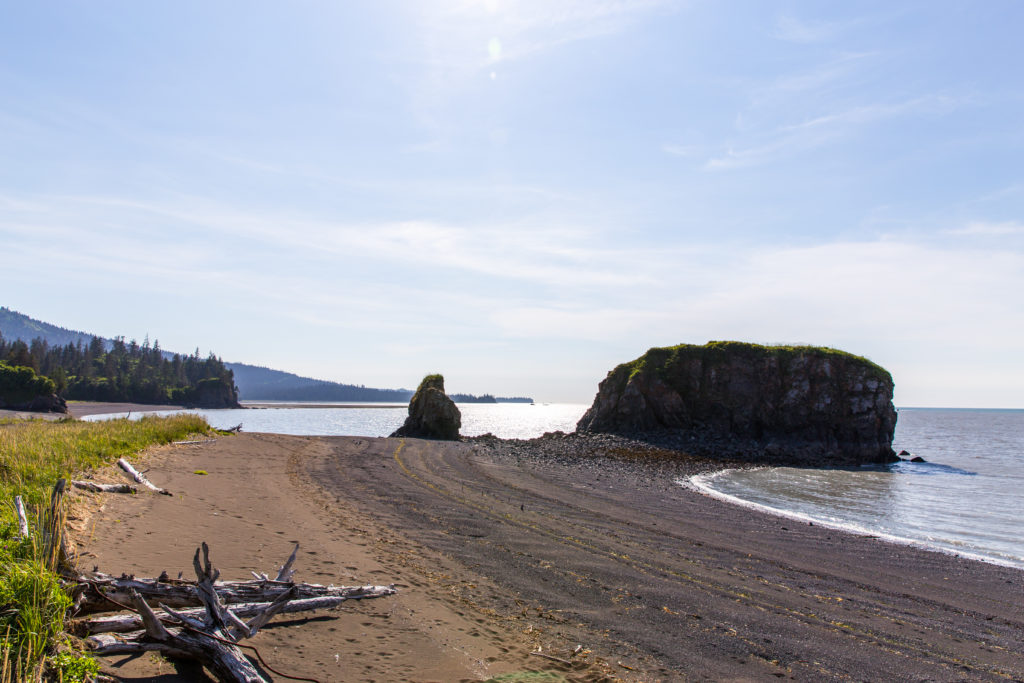

Chuck called it a real Alaskan experience and the only reason I could laugh was because I was back. While on the trail, I hated every part of it. Being back I love the experience.
The last day in Alaska I spent with my Kayak guide out of Whittier, Pablo, who lives in Argentina (Patagonia) and who visited a friend of his who by chance is a very good friend of Chuck. These coincidences in Alaska were really crazy. I also shared the taxi from the airport with a lady who told me she knows another german who has been on exchange in Anchorage for a year (at age 16) and has spent his year traveling. Well that kid I had met on the Bonanza mine hike back in Kennecott. Oh by the way, Chucks favorite hike in South America leaves from Chile Chico in Chile which is 2kms away from Los Antiguos. Pablo lives in Los Antiguos and I am definitely going to visit him in Patagonia. Talking about coincidences.
That was it for me in Alaska. Two month come to an end and it feels like it has only been a few weeks. I experienced all the common ups and downs on that trip: From feeling very disappointed in not finding fellow backpackers in my first weeks and asking myself whether I should leave Alaska until the real season kicks in; To being very satisfied with my accomplishments and my ability to be happy despite being all on my own. The latter has been one of the greater challenges of my life. Alaska has been exactly as expected when judging the extreme and vast nature and completely different from my expectations considering the other tourists I would meet and travel with. Not finding fellow backpackers has lead to meeting more of the local people and that resulted in wonderful experiences (Jim in the plane, Heather, Taylor and Taylor the travel nurses, Matt in the Cookery, Jason with his cabin in Juneau and last but not least Stephanie and Chuck in Homer). I am very thankful for these encounters and you are all welcome to stay at my place wherever I may live. Especially thanks to Stephanie and Chuck who treated me like family in Homer and who are such wonderful people. I wish you a healthy future.
I end the blog with a saying I found on Chucks fridge which is exactly what I tell people why I love the mountains:
“The birds have vanished into the sky, and now the last cloud drains away. We sit together, the mountain and me, until only the mountain remains.” Li Po
